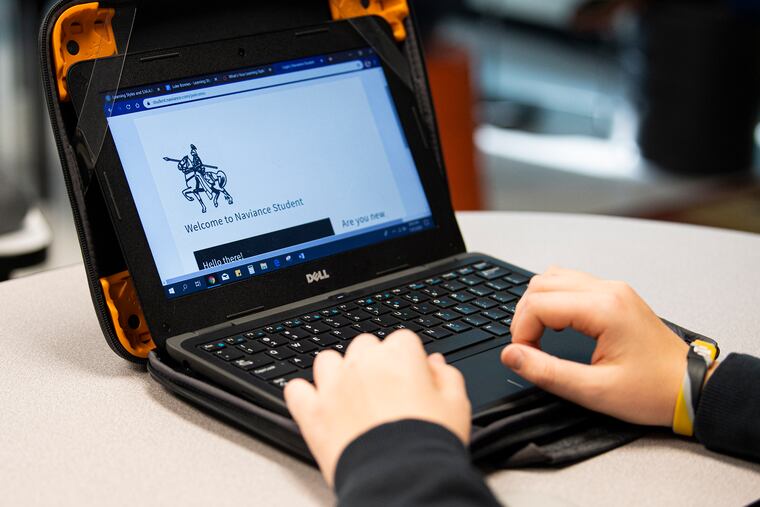Gov. Wolf’s 2021 budget offers new opportunity to hold cyber charters accountable | Opinion
Pennsylvania’s newly elected auditor general, Timothy DeFoor, must lay out a calendar to audit every cyber charter school.

A new legislative session in Harrisburg and state budget negotiations for the coming months, following Gov. Tom Wolf’s budget address Wednesday, bring opportunities for elected officials to end gross overpayments to Pennsylvania’s cyber charter schools to ensure that these schools are held to the same financial accountability standards as public school districts.
Recent reporting in the Scranton Times-Tribune revealed a stunning lack of state oversight over the taxpayer dollars that have been poured into cyber charters over the past two decades. Six of Pennsylvania’s 14 cyber charter schools have never been audited. Commonwealth Charter Academy, the largest cyber charter in the state with an expected $270 million budget for 2021, was last audited in 2012.
Cyber charter schools are projected to receive more than $980 million in taxpayer-funded tuition payments in the 2020-21 school year. With no state oversight, the opportunities for waste, fraud, and abuse are staggering.
» READ MORE: Cyber charter enrollments are surging. School districts are picking up the tab.
Pennsylvania’s newly elected auditor general, Timothy DeFoor, must lay out a calendar to audit every cyber charter school, beginning with those that have the largest budgets.
The commonwealth audits brick-and-mortar school districts every three years to ensure that they are using taxpayer dollars properly. These audits are publicly posted for taxpayers to view. It is past time for the Auditor General’s Office to end the special treatment that has been bestowed on cyber charter schools and audit them regularly.
The General Assembly must also take action to eliminate enormous overpayments to cyber charter schools.
Pennsylvania’s system for funding cyber charters defies common sense. Cyber charters receive the same tuition payments from taxpayers as brick-and-mortar charter schools — even though they have none of the brick-and-mortar expenses. No school buildings to heat or grounds to maintain. No costs for custodians and maintenance workers. No buses for students. And the list goes on.
While school districts continue to face brutal struggles with increased mandated costs and reduced local revenues as a result of COVID-19, the pandemic has been a financial boon for cyber charters. An enrollment spike combined with tuition rate increases pursuant to the state’s current charter school policy means school districts are projected to pay cyber charters more than $980 million this school year — a 51% increase over last year. Cyber charters will also receive nearly $60 million from spring and winter federal COVID-19 aid for schools and millions in federal PPP grants.
The evidence that cyber charter schools are awash in excess taxpayer funding that they waste has been in plain sight for years. Taxpayer-funded advertisements abound on billboards, radio, and television. They are ubiquitous on phone apps and on Facebook. And this advertising is not cheap. A 2019 Right to Know request filed by Education Voters of PA found that in 2018, a single charter school, Commonwealth Charter Academy, spent more than $7 million on advertising and promotion, including $850,000 on a three-month campaign to increase enrollment.
» READ MORE: Cyber charters transformed my struggling kids. Why do Pa. politicians want to change my choice? | Opinion
In addition, recent Right to Know requests obtained by the Times-Tribune revealed that one cyber charter spent nearly $1,000 per student on advertising in 2019. The paper also documented that cyber charters spent taxpayer money to purchase cell phones and Target gift cards for students and to provide families with cash payments.
And in November, when many school districts were struggling to pay for PPE and the additional staff necessary to safely open schools while following social distancing safety protocols, Commonwealth Charter Academy was at the Harrisburg Reverse Holiday Parade showing off a robot dog that sells for $75,000. While this robot was an eye-catching recruitment tool for CCA, Pennsylvanians might wonder if school funding would have been better spent hiring a full-time teacher, counselor, or nurse to work with students.
Pennsylvanians are paying higher school property taxes in every corner of the state to fund lucrative contracts with communications firms and expensive advertising campaigns while students in their own district schools lack the counselors, teachers, and support they need.
» READ MORE: Cyber charters may benefit from pandemic, but that doesn’t mean their students do | Editorial
This is wrong.
Charter school funding reforms are at the top of Gov. Wolf’s education priority list. It is time for the Republican-led General Assembly to follow his lead, stand up for taxpayers, and support financial accountability and a rational system of funding for the cyber charter school sector. If these schools are really worth every penny, let them prove it.
Susan Spicka is the executive director of Education Voters of PA.